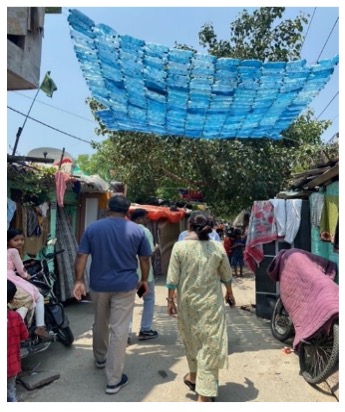Sustainable Environment and Ecological Development Society (SEEDS), 2023
Implementing Partners: SEEDS, Microsoft
Published In: COP28 Prospectus of Climate-Health Solutions, 2023
Sustainable Environment and Ecological Development Society (SEEDS), 2023
Implementing Partners: SEEDS, Microsoft
Published In: COP28 Prospectus of Climate-Health Solutions, 2023
Climate change is causing an increase in the frequency and magnitude of extreme weather events such as heatwaves, floods, and droughts. Extreme weather events lead to loss of human life and have devastating consequences on socio-economic outcomes. In India, most vulnerable communities do not have access to either information about the occurrence of these events, or the understanding of risk from current warnings. This lack of useful information inhibits pre-emptive and potentially life saving action.
SEEDS, in partnership with Microsoft, has developed the AI for Resilient Cities model. The AI for Good Lab research program has been funded primarily by Microsoft. The model leverages weather datasets (e.g., temperature patterns, built-up roof type classification, vegetation cover, water bodies) and high resolution satellite imagery to identify areas at high risk of heatwaves. SEEDS uses the AI generated maps to find high risk homes, prioritize outreach for early warning and preparation, and demonstrate the significance of heat risks to locals (since many residents underestimate the danger that they face). Furthermore, early heatwave warning allows healthcare providers to take proactive measures to protect public health, reducing the overall burden of heatwaves on the healthcare system and leading to more climate-resilient cities. Evidence based outreach also allows SEEDS to implement long term heat mitigation interventions such as:



of
Once the AI tool has identified the households at risk, SEEDS begins outreach to prepare for the upcoming heatwave and implement solutions. Approximately 2,500 volunteers from the local community have been engaged by SEEDS thus far. The outreach program has included the following activities:
Besides the community, SEEDS partnerships also extend to government organizations and agencies who focus on climate resilience, heat and health.
The community outreach efforts in heatwave campaigns have been successful and extended to a significant audience, with over 72,000 individuals reached in 2023. In its broader work, SEEDS has reached over 6 million people and by 2030, SEEDS aims to help 315 million people survive, adapt and thrive in India’s disaster prone areas.
Beat the heat campaign surveys were conducted to assess the impact of the measures implemented. The outcomes assessed can be categorized into behavioural and infrastructure changes. The behavioral outcomes are derived from staying indoors or by accessing shade, staying hydrated and changing eating habits. The infrastructure outcome relates to the insulation provided in roofing structure interventions, where the measures have provided sun protection and heat protection, improved thermal comfort and reduced health related impacts.
The existing framework for the AI for Resilient Cities program exhibits high scalability potential because of its community centric design, so the program can easily be tailored to suit diverse cultural, social, and geographical contexts. By combining data driven modelling with community engagement and low cost, sustainable interventions, it offers a holistic approach to climate adaptation.